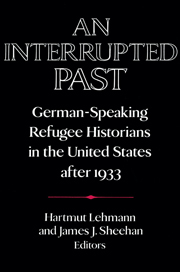Book contents
- Frontmatter
- Introduction
- PART I: Introduction
- 1 German and American Historiography in the Nineteenth and Twentieth Centuries
- 2 German Historiography during the Weimar Republic and the Émigré Historians
- 3 The Historical Seminar of the University of Berlin in the Twenties
- PART II: Introduction
- 4 Refugee Historians in America: Preemigration Germany to 1939
- 5 “Uphill Work”: The German Refugee Historians and American Institutions of Higher Learning
- 6 Everyday Life and Emigration: The Role of Women
- 7 The Special Case of Austrian Refugee Historians
- 8 Schicksalsgeschichte: Refugee Historians in the United States
- 9 German Historians in the Office of Strategic Services
- 10 The Refugee Scholar as Intellectual Educator: A Student's Recollections
- PART III: Introduction
- 11 German Émigré Historians in America: The Fifties, Sixties, and Seventies
- 12 The Americanization of Hajo Holborn
- 13 Explaining History: Hans Rosenberg
- 14 Ernst Kantorowicz and Theodor E. Mommsen
- 15 Refugee Historians and the German Historical Profession between 1950 and 1970
- Conclusion
- Index
5 - “Uphill Work”: The German Refugee Historians and American Institutions of Higher Learning
Published online by Cambridge University Press: 05 January 2013
- Frontmatter
- Introduction
- PART I: Introduction
- 1 German and American Historiography in the Nineteenth and Twentieth Centuries
- 2 German Historiography during the Weimar Republic and the Émigré Historians
- 3 The Historical Seminar of the University of Berlin in the Twenties
- PART II: Introduction
- 4 Refugee Historians in America: Preemigration Germany to 1939
- 5 “Uphill Work”: The German Refugee Historians and American Institutions of Higher Learning
- 6 Everyday Life and Emigration: The Role of Women
- 7 The Special Case of Austrian Refugee Historians
- 8 Schicksalsgeschichte: Refugee Historians in the United States
- 9 German Historians in the Office of Strategic Services
- 10 The Refugee Scholar as Intellectual Educator: A Student's Recollections
- PART III: Introduction
- 11 German Émigré Historians in America: The Fifties, Sixties, and Seventies
- 12 The Americanization of Hajo Holborn
- 13 Explaining History: Hans Rosenberg
- 14 Ernst Kantorowicz and Theodor E. Mommsen
- 15 Refugee Historians and the German Historical Profession between 1950 and 1970
- Conclusion
- Index
Summary
If there is one word to describe the story of the scholarly migration, that word is “cooperation.” The successful integration of the refugee scholars into the American academic environment relied upon the unified efforts of four protagonists: funding agencies, American institutions of higher learning, the Emergency Committee in Aid of Displaced Foreign Scholars, and the individual refugee scholars themselves. In the public eye, the Emergency Committee assumed the lead role in the concerted activities of those groups. But if the Emergency Committee had the most visible role, it did not have the greatest influence upon the outcome of the migration. That role was occupied by the nation's institutions of higher learning and influenced in its direction by the behavior of the refugee scholars. The committee's allocation of funds depended entirely upon the application, usually from a university president or other high-ranking official, for the presence of a particular refugee scholar. The Emergency Committee, the additional sources of funding, and the futures of the refugee scholars thus took their cues from the decisions made by American faculties and supported by American university and college administrations. The migration of the refugee historians, then, needs at the outset to be viewed within the context of the relationship between the universities and the larger migration of refugee scholars.
- Type
- Chapter
- Information
- An Interrupted PastGerman-Speaking Refugee Historians in the United States after 1933, pp. 94 - 101Publisher: Cambridge University PressPrint publication year: 1991
- 1
- Cited by



